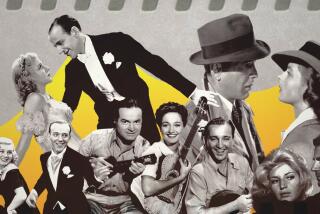TV Forgets One of Its Own
- Share via
NEW YORK — TV goes nuts for anniversaries.
Take last May, when NBC aired specials celebrating 75 years as a radio and television network, 20 years of “Must-See TV,” and a decade each of “Dateline NBC” and Jay Leno. Meanwhile, ABC staged a golden anniversary salute to “American Bandstand.” Ditto CBS for “The Honeymooners.”
But now, how about some shows to give viewers the big picture? How about celebrating the birth of television and paying delayed tribute to television’s creator?
It seems to have escaped the networks’ notice, but Saturday is the 75th anniversary of the first successful demonstration of television. Making it happen was Philo T. Farnsworth, who, hardly a household name, remains television’s invisible inventor.
Because the networks won’t likely re-enact Farnsworth’s big moment, you’ll have to visualize it for yourself. The setting: his modest San Francisco lab where, on Sept. 7, 1927, the 21-year-old self-taught genius transmitted the image of a horizontal line to a receiver in the next room.
Later that day, he triumphantly wired one of his backers in Los Angeles: “The damned thing works!”
It worked--just like Farnsworth had imagined when, as a 14-year-old Idaho farm boy already obsessed with inventing television, he had been plowing a field and realized an image could be scanned onto a picture tube the same way: row by row.
It worked--yet Farnsworth would be denied credit, fame and wealth befitting the father of the world’s most powerful communications tool.
His sole appearance on national television was as a mystery guest on the CBS game show “I’ve Got a Secret” in 1957. He fielded questions from the celebrity panelists as they tried in vain to guess his secret (“I invented electronic television”). For stumping them, Farnsworth took home $80 and a carton of Winston cigarettes.
Forty-five years later (and three decades after his death in 1971), “I’ve Got a Secret” could still be the slogan for Farnsworth and his 94-year-old widow, Pem, who worked at his side through much of his career.
How ironic. In this media-savvy age, not only should his name be as widely known as Edison’s or Ford’s, but his long, lean face with the bulbous brow should be as familiar as any pop icon’s.
Saturday would have been a great day for TV to tell Farnsworth’s story.
Picture it: live coverage originating from his laboratory space. A musical-variety special with TV’s biggest stars paying homage to the man they owe for their livelihood. Every network briefly going to black to acknowledge where they’d be without Farnsworth. (And that’s just for starters!)
Picture it, but don’t bet on it. By now, TV is generally assumed to be naturally occurring, like water or air.
Anyone who suspects otherwise likely believes that TV’s creator was a then-mighty company called RCA. This is a version of history RCA was pushing even as its boss, David Sarnoff, tried to crush “The Last Lone Inventor” (aptly dubbed by a recent Farnsworth biography of that title). It’s a version of history that NBC, which Sarnoff founded, clearly has no incentive to revise, even today.
Never mind the record says otherwise. In 1935, the courts ruled on Farnsworth’s patent, which RCA was contesting as part of Sarnoff’s endless campaign of litigation, propaganda and dirty tricks. The decision, upheld on appeal: Farnsworth, not RCA’s chief television engineer, Vladimir Zworykin, is the father of TV.
Now, 75 years after a fuzzy line sparked a revolution, television, like the nation, is focused on the anniversary that trails Sept. 7 by four days.
Of course, remembering the 9/11 attacks provides added reason to appreciate, not overlook, Farnsworth. When covering that tragedy, TV was at its finest and most indispensable. However unsung, Farnsworth was part of the effort.
But waiting two more weeks won’t make much difference. What about the Emmy Awards? Airing Sept. 22 on NBC, it would be a fitting occasion for a give-the-man-his-due show of thanks.
At least, that’s the sentiment some Philophiles have conveyed to the Academy of Television Arts & Sciences and the Emmycast’s executive producer, Gary Smith.
“We are sympathetic to the desire to honor Farnsworth’s accomplishments. They’re huge,” academy Chairman Bryce Zabel said.
How exactly to do it, he added, “is something that’s being talked about.”
Maybe so. But as Farnsworth showed in many ways, what counts is what people can see.
More to Read
The complete guide to home viewing
Get Screen Gab for everything about the TV shows and streaming movies everyone’s talking about.
You may occasionally receive promotional content from the Los Angeles Times.





